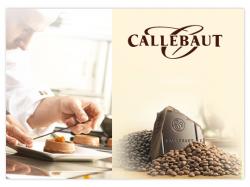Callebaut Launches Fairtrade Certified Chocolate
December 20, 2011 | 3 min to read

CHICAGO, IL — Callebaut® Finest Belgian Chocolate™ announced the launch of Fairtrade certified versions of its popular 811NV (55.3% Cacao Dark), 823NV (35.1% Milk) and 70-30-38NV (70% Cacao Dark) references to confectioners, bakers and pastry chefs.
Confectioners, bakers and pastry chefs now have more options to meet growing consumer demand for Fairtrade ingredients. At the same time, Callebaut's new Fairtrade options require no recipe adjustments, providing the same great taste, flavor and workability as their standard counterparts. The Fairtrade chocolate will be available as callets in 10 kg bags.
"The rising future demand for cocoa and chocolate means we are constantly looking for better, more sustainable ways to grow cocoa and to ensure that chocolate is available for future generations to enjoy," said Mike Schrauth, Senior Director of Sales and Marketing, Gourmet, Barry Callebaut. "The launch of Callebaut's new Fairtrade chocolate products is an important step."
Callebaut's Fairtrade chocolate consists of raw ingredients that are available to be certified Fairtrade, including all cocoa ingredients, sugar and natural vanilla. Callebaut purchases the Fairtrade cocoa beans from cooperatives in the Ivory Coast and in Ghana. The Fairtrade sugar originates from cooperatives in Malawi, Belize and Mauritius, while the Fairtrade natural vanilla comes from cooperatives in Madagascar.
The FAIRTRADE Certification Mark ensures that the product meets certain economic, social and environmental standards. The Mark is the most widely recognized social and development label in the world, and a registered trademark of Fairtrade International (FLO). According to FLO, sales of Fairtrade certified products have been growing on average of 40 percent per year over the past five years.
For confectioners, bakers and pastry chefs, there is no additonal administrative cost or work with FLO if they purchase the new Callebaut Fairtrade certified chocolate products. They just have to register with FLO at www.fairtrade.net. This allows interested consumers to search for users or purchasers of the Fairtrade chocolate in their geographic area.
About Callebaut® (www.callebaut.com):
For 100 years, Callebaut® has been making chocolate in the heart of Belgium and is still one of the rare chocolate makers to select, roast and grind cacao beans into its own secret and exclusive cocoa mass — the most important ingredient for chocolate couvertures. Callebaut® was established in 1850 in Belgium as a malt brewery and dairy company. It produced its first chocolate bars in 1911 and began production of chocolate couverture for Belgian chocolatiers in 1925. Callebaut® began exporting its products in 1950 and is part of Barry Callebaut, the world's leading manufacturer of high-quality cocoa and chocolate.
Barry Callebaut (www.barry-callebaut.com):
With annual sales of about CHF 4.6 billion (EUR 3.6 billion/USD 5.0 billion) for fiscal year 2010/11, Zurich-based Barry Callebaut is the world's leading manufacturer of high-quality cocoa and chocolate — from the cocoa bean to the finished chocolate product. Barry Callebaut is present in 27 countries, operates around 40 production facilities and employs a diverse and dedicated workforce of about 6,000 people. Barry Callebaut serves the entire food industry focusing on industrial food manufacturers, artisans and professional users of chocolate (such as chocolatiers, pastry chefs or bakers), the latter with its two global brands Callebaut® and Cacao Barry®. Barry Callebaut is the global leader in cocoa and chocolate innovations and provides a comprehensive range of services in the fields of product development, processing, training and marketing. Cost leadership is another important reason why global as well as local food manufacturers work together with Barry Callebaut. Through its broad range of sustainability initiatives and research activities, the company works with farmers, farmer organizations and other partners to help ensure future supplies of cocoa and improve farmer livelihoods.
Source: Barry Callebaut
